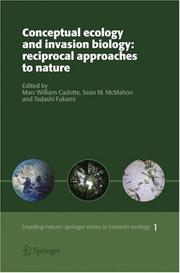| Listing 1 - 3 of 3 |
Sort by
|
Book
ISBN: 1400881196 Year: 2016 Publisher: Princeton, NJ : Princeton University Press,
Abstract | Keywords | Export | Availability | Bookmark
 Loading...
Loading...Choose an application
- Reference Manager
- EndNote
- RefWorks (Direct export to RefWorks)
Phylogenies in Ecology is the first book to critically review the application of phylogenetic methods in ecology, and it serves as a primer to working ecologists and students of ecology wishing to understand these methods. This book demonstrates how phylogenetic information is transforming ecology by offering fresh ways to estimate the similarities and differences among species, and by providing deeper, evolutionary-based insights on species distributions, coexistence, and niche partitioning. Marc Cadotte and Jonathan Davies examine this emerging area's explosive growth, allowing for this new body of hypotheses testing.Cadotte and Davies systematically look at all the main areas of current ecophylogenetic methodology, testing, and inference. Each chapter of their book covers a unique topic, emphasizes key assumptions, and introduces the appropriate statistical methods and null models required for testing phylogenetically informed hypotheses. The applications presented throughout are supported and connected by examples relying on real-world data that have been analyzed using the open-source programming language, R.Showing how phylogenetic methods are shedding light on fundamental ecological questions related to species coexistence, conservation, and global change, Phylogenies in Ecology will interest anyone who thinks that evolution might be important in their data.
Phylogeny. --- Ecology. --- Evolution (Biology) --- Brownian motion. --- R package. --- R phylogenetic object. --- allopatry. --- ancestral states. --- biodiversity hotspots. --- biodiversity. --- climate change. --- co-occurring species. --- community assembly. --- competition. --- conservation biology. --- conservation. --- continuous data. --- discrete data. --- dispersal. --- distance-based methods. --- diversification. --- diversity partitioning. --- ecological analysis. --- ecological assembly. --- ecological character displacement. --- ecological divergence. --- ecological phylogenetics. --- ecology. --- ecophylogenetic methodology. --- ecophylogenetics. --- edge length. --- evolution. --- evolutionary distinctiveness. --- evolutionary history. --- evolutionary models. --- evolutionary patterns. --- evolutionary theory. --- extinction. --- geography. --- global change. --- macroevolution. --- maximum likelihood. --- neutral theory. --- niche partitioning. --- null model. --- pairwise distances. --- phylobetadiversity. --- phylodiversity. --- phylogenetic correction. --- phylogenetic data. --- phylogenetic distance. --- phylogenetic diversity. --- phylogenetic diversityСrea relationships. --- phylogenetic information. --- phylogenetic methods. --- phylogenetic patterns. --- phylogenetic relationships. --- phylogenetic signal. --- phylogenetic tests. --- phylogenetic tree. --- phylogenetic turnover. --- phylogenetics. --- phylogeny. --- randomization. --- rate smoothing. --- relatedness. --- scale dependency. --- selection. --- spatial scale. --- speciation. --- species coexistence. --- species conservation. --- species distribution. --- species distributions. --- species interrelatedness. --- species invasion. --- species pool. --- species richness. --- speciesЧenus ratios. --- traits. --- tree of life. --- tree scaling. --- white noise.
Book
ISBN: 9781400881192 Year: 2016 Publisher: Princeton, NJ
Abstract | Keywords | Export | Availability | Bookmark
 Loading...
Loading...Choose an application
- Reference Manager
- EndNote
- RefWorks (Direct export to RefWorks)

ISBN: 1402041586 9781402041587 1402041578 9786610624836 1280624833 1402049250 9781402041570 9781402049255 Year: 2006 Publisher: Dordrecht : Springer Netherlands : Imprint: Springer,
Abstract | Keywords | Export | Availability | Bookmark
 Loading...
Loading...Choose an application
- Reference Manager
- EndNote
- RefWorks (Direct export to RefWorks)
The conservation threat represented by invasive species is well-known, but the scientific opportunities are underappreciated. Invasion studies have historically been largely directed at the important job of collecting case studies. Invasion biology has matured to the point of being able to incorporating itself into the heart of ecology, and should be viewed as extensions or critical experiments of ecological theory. In this edited volume, global experts in ecology and evolutionary biology explore how theories in ecology elucidate the invasion processes while also examining how specific invasions informs ecological theory. This reciprocal benefit is highlighted in a number of scales of organization: population, community and biogeographic, while employing example invaders in all major groups of organisms and from a number of regions around the globe. The chapters in this volume utilize many of the cutting edge observational, experimental, analytical and computational methods used in modern ecology. Through merging conceptual ecology and invasion biology we can obtain a better understanding of the invasion process while also developing a better understanding of how ecological systems function.
Plant ecology. Plant sociology --- Biological invasions. --- Ecology. --- Biological invasions --- Invasions biologiques --- EPUB-LIV-FT SPRINGER-B LIVBIOLO --- Applied Ecology. --- Nature Conservation. --- Terrestial Ecology. --- Theoretical Ecology/Statistics. --- Balance of nature --- Biology --- Bionomics --- Ecological processes --- Ecological science --- Ecological sciences --- Environment --- Environmental biology --- Oecology --- Environmental sciences --- Population biology --- Conservation of nature --- Nature --- Nature protection --- Protection of nature --- Conservation of natural resources --- Applied ecology --- Conservation biology --- Endangered ecosystems --- Natural areas --- Ecology --- Environmental protection --- Nature conservation --- Conservation --- Ecology . --- Applied ecology. --- Nature conservation.
| Listing 1 - 3 of 3 |
Sort by
|

 Search
Search Feedback
Feedback About
About Help
Help News
News